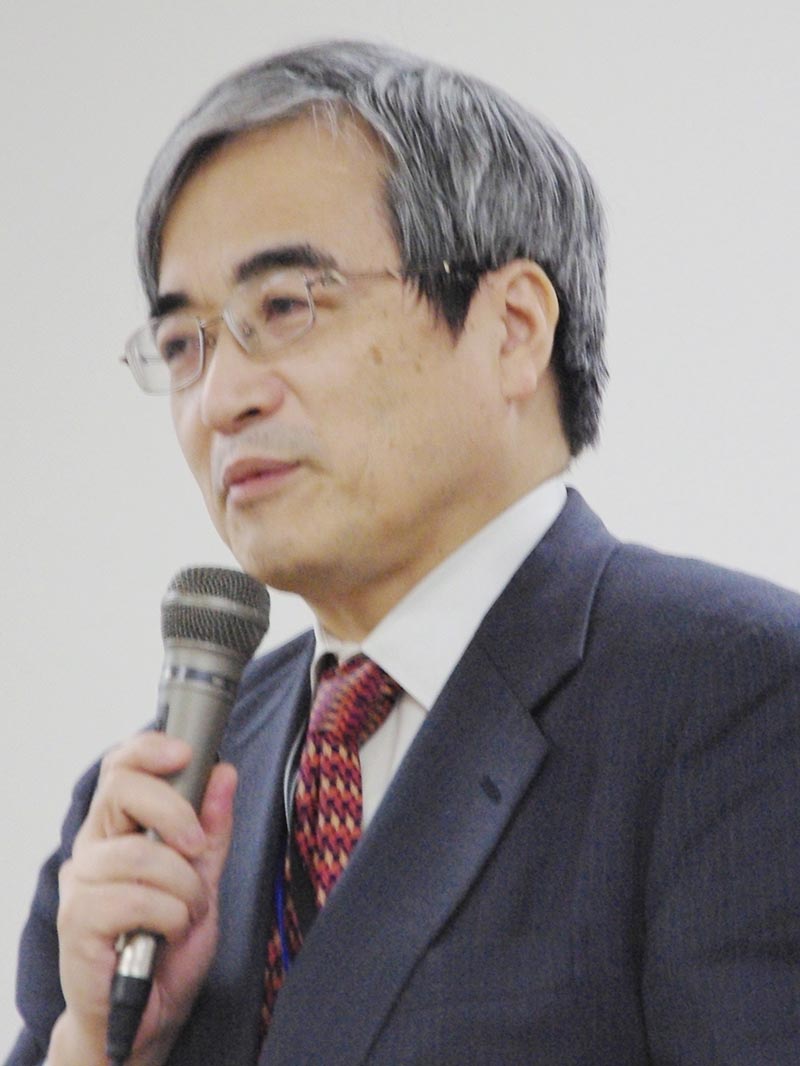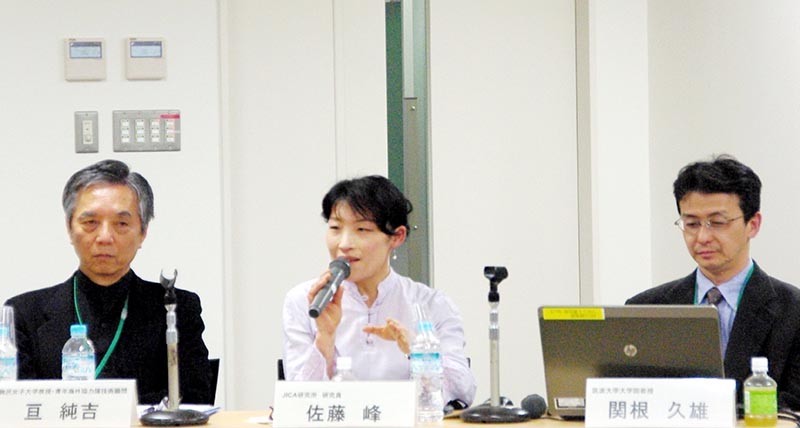Japan Overseas Cooperation Volunteers' Seminar on the Nexus between JOCV and Anthropology is Held
2014.03.31
JICA-RI currently conducts a research project entitled “the Interdisciplinary Study of Japan Overseas Cooperation Volunteers (JOCV),” which examines various topics related to the JOCV program from different academic perspectives. As part of the research project, JICA-RI holds JOCV seminars on an irregular basis to disseminate its research results and to build a network. On March 20, JICA-RI hosted a seminar titled “Perspectives to Observe Local Communities: JOCV and Anthropology,” the second event that followed the first one held in September 2013.
The seminar began with opening remarks from JICA-RI Director Hiroshi Kato. Research Fellow Mine Sato, who followed Kato’s speech, briefed the objective of this seminar. She explained that the basic approach of anthropology is to attempt to understand local people and their society “as they are” through participant observations and interviews during long-term field surveys. Sato pointed out that this approach is compatible with the basic stance of JOCV which is symbolized by a motto “Together with local people” along with a possibility of collaboration between anthropology and JOCVs’ activities.

Hiroshi Kato
Professor Junkichi Watari of Komazawa Women’s University made a presentation titled “Delivering the Wisdom of Fieldwork.” Professor Watari, technical advisor to JOCVs, has been engaging in pre-dispatch training courses for many years. According to the training handbook, one of the competencies required for JOCVs is “to have the cultural grounding to observe and understand human behaviors in different ethnic communities.” Referring to the understanding of culture as the precondition of JOCVs’ activities, he explained the significance of anthropological perspectives—pondering what culture is—in JOCVs’ activities. What he emphasized was the importance of the following anthropological visions: observing how local people perceive their societies rather than just observing local people; and recognizing the differences and commonalities between the way of looking at things by local people and that of us.

Junkichi Watari(left), Mine Sato(center),
Hisao Sekine(right)
Professor Watari stressed that with these above-mentioned visions, volunteers can achieve the three objectives of the JOCV program: (1) engaging in dialogue and interacting with individual people in specific local communities, and offering feasible solutions to various problems from local peoples’ views through trial and error; (2) mutual understanding; and (3) passing on what they have learned to Japanese society.
Subsequently Professor Hisao Sekine of the University of Tsukuba gave a presentation titled “The Pacific Island Nations and JOCVs: from a Regional Vision.” Based on his experience as a JOCV and his later research outcomes, he is currently engaged in research on emotions and practices in development aid at the National Museum of Ethnology. As part of the study, he attempts to analyze changes in the sentiment of JOCVs through looking into the regional characteristics, drawing on the interviews with JOCVs in the Solomon Islands.
Professor Sekine discussed as follows. In the Pacific island region, due to the rich natural resources and reciprocal relationships in traditional societies, they tend to think they have enough to survive and not to accept anything strange. Those volunteers assigned to the regions where local people are unlikely to do anything question themselves why they are here. However, relativizing the situation from an anthropological perspective enables them to understand that pushing for industrial development is not the only way. Volunteers also begin to see local people’s positive side—generous, kind, and laid-back—although these characteristics contribute to their “unwillingness.” Professor Sekine pointed out that JOCVs’ perspectives change over time, so that they don’t cling to results. He concluded his presentation by arguing that the greatest achievement of the JOCV program could be local people’s fond memories of volunteers in the Pacific island nations along with volunteers’ personal growth.

事業事前評価表(地球規模課題対応国際科学技術協力(SATREPS)).国際協力機構 地球環境部 . 防災第一チーム. 1.案件名.国 名: フィリピン共和国.

事業事前評価表(地球規模課題対応国際科学技術協力(SATREPS)).国際協力機構 地球環境部 . 防災第一チーム. 1.案件名.国 名: フィリピン共和国.

事業事前評価表(地球規模課題対応国際科学技術協力(SATREPS)).国際協力機構 地球環境部 . 防災第一チーム. 1.案件名.国 名: フィリピン共和国.

事業事前評価表(地球規模課題対応国際科学技術協力(SATREPS)).国際協力機構 地球環境部 . 防災第一チーム. 1.案件名.国 名: フィリピン共和国.

事業事前評価表(地球規模課題対応国際科学技術協力(SATREPS)).国際協力機構 地球環境部 . 防災第一チーム. 1.案件名.国 名: フィリピン共和国.
scroll